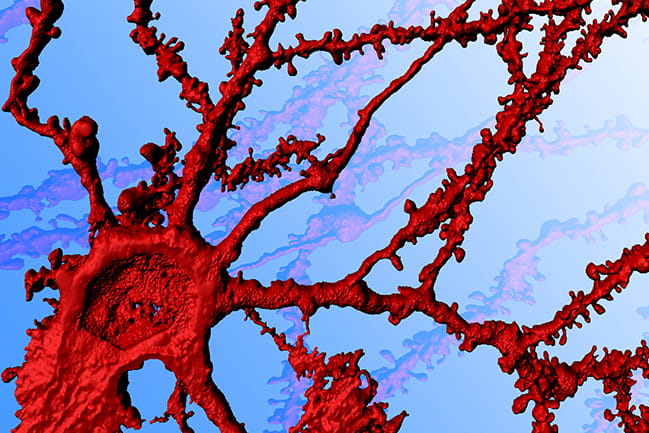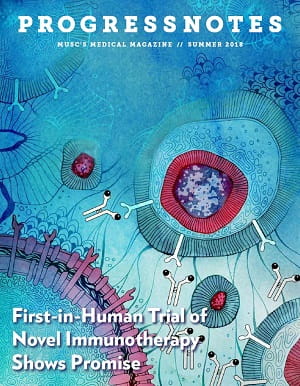Misconnections in Developmental Disorders & Addiction

Revealing possible links through genes that control brain wiring
BY VITRIA ADISETIYO
Sparks to discoveries
How do humans have different personalities, different strengths or weaknesses, different ways of perceiving and adapting to the world? These are the fundamental questions that continue to fascinate Christopher W. Cowan, Ph.D., a professor and vice chair in the Department of Neuroscience and the William E. Murray SmartState™ Endowed Chair of Excellence in Neuroscience at MUSC—a career progression that stems from his early curiosities as a fourth-grader dissecting frog brains in his garage.
In his laboratory, Cowan and his team unravel the brain’s mysteries by exploring the genes and molecular mechanisms that control proper brain wiring during development. His goal is to understand their roles in developmental disorders and addiction which, according to Cowan, are both disorders of brain connectivity and function.
“It comes down to brain plasticity, how the brain changes in response to an experience,” explains Cowan. “The genetics of brain development represents the crude blueprint. Our cells have all the basic information but have evolved to respond to changes, especially as there are important gene-environment interactions that occur throughout life. During development, you’re experiencing the world for the first time and the brain is shaping neural circuits in response. In individuals suffering from substance use disorders, these same systems are being hijacked in parts of the brain that process reward experiences.”
Groundbreaking work from Cowan’s laboratory reveals that abnormal brain wiring may be the culprit in many developmental disorders and addictions. His team has pinpointed several important genes that influence brain connectivity that may hold promise for generating desperately needed therapies.
“I think that most brain disorders are influenced strongly by our genetics,” says Cowan. “My principal interest is to understand the genes that are orchestrating typical brain development, particularly the signaling pathways that translate individualized experiences to the nucleus and tell the cell to adapt.”
Developmental disorders: master regulators gone awry
According to the National Center for Health Statistics, seven percent of children ages three to seventeen have been diagnosed with a developmental disorder; this includes autism spectrum disorder, intellectual disability and developmental delay.1 Although there is no cure, early intensive cognitive behavioral therapy has been shown to improve outcomes. Motivated by the urgency for earlier screening and intervention, Cowan has centered one part of his research on understanding the genetic risk factors for developmental disorders.
“Many of the genes that are important for development turn out to be master regulators, in that they affect the expression of hundreds or thousands of other genes,” says Cowan. “My lab is focused on transcription factors that are developmentally regulated, because a transcription factor is a protein that sits on your DNA in the cell nucleus, and it reads off the genes that ultimately make the protein products.”
Work from Cowan’s laboratory has shown that MEF2C is one such “hub gene” that may play a central role in developmental disorders. The MEF2C gene is highly expressed in the brain, immune system and muscle. It encodes for a transcription factor that acts as a temporary “on and off switch” for many other genes, including hundreds of autism risk genes and genes controlling brain connectivity. Children with MEF2C haploinsufficiency (deletion or mutation in one of two copies of MEF2C) have intellectual disabilities and symptoms resembling autism and attention-deficit/hyperactivity disorder. However, it is unclear how or why MEF2C gene mutations disrupt typical development.
Cowan and his team have begun to unearth some clues, first by examining MEF2C’s role in the brain. They demonstrated that when the MEF2C gene is selectively deleted in the developing mouse brain, the animal displayed reduced social behaviors and vocalizations, increased repetitive movements and deficits in learning and memory—all common autism-associated symptoms.2
Cowan’s group discovered that these MEF2C mutant mice had dramatically decreased brain activity stemming from an imbalance in brain connectivity. They found a decrease in the neural connections that excite brain activity and an increase in connections that inhibit brain activity. Remarkably, these effects were reversed when MEF2C was put back into the cells from which it had been deleted.2
The therapeutic implications of these findings are significant, particularly as prenatal screening for MEF2C mutations is not a standard clinical practice. Genetic profiling is typically conducted when a child presents with developmental delay around one to two years of age. Given this reality, a pressing question Cowan hopes to address is whether interventions are possible during this clinical window.
“We know what the problem is, these kids don’t have enough MEF2C,” says Cowan. “What we want to know is, ‘Can we reverse these changes with drugs that increase MEF2C function, and when can we act? Is MEF2C playing a more important role prenatally or postnatally? And since every cell in the body has lost a copy of MEF2C, which cells are mediating the greatest effect?’”
Understanding the holistic effects of MEF2C would significantly inform therapeutic strategies. Cowan’s team has already shown how MEF2C is important for shaping brain connections during development, but more work is being done to elucidate MEF2C’s role in other systems in the body. More recently, Cowan’s group is working with South Carolina’s Greenwood Genetics Center to help move their animal studies into future treatments for this genetic disorder.
Addiction: hijacking brain plasticity
The profound effects that an imbalance of brain connections has on behavior during development also extends to addiction, a still incurable disorder that affects over 20 million Americans.3
“During development, brain plasticity is happening dynamically. Anytime we have an experience that is very impactful to us, those events can become fairly hardwired in the brain,” explains Cowan. “This occurs with drugs of abuse, but at a level beyond what our brain is adapted to handle. Drugs appear to hijack healthy brain plasticity by triggering strong, enduring changes in the way the brain reward circuit is responding.”
Although environmental risk factors play an important role in addiction, identical twin studies indicate that at least half of addiction risk is genetic. Cowan’s other main area of research is on understanding this genetic vulnerability for addiction.
One family of genes that his team is focused on is epigenetic enzymes. These are unique enzymes that modify gene expression by changing the structure of DNA rather than the genetic code itself. Unlike the temporary control that transcription factors often have on genes, these enzymes can semi-permanently change the way DNA is folded, making genes accessible or inaccessible.
“Epigenetic enzymes are powerful molecular mechanisms to control change within neurons and brain circuits, because changes at the level of the DNA structure can be very long-lasting,” explains Cowan. “Once inside the nucleus, these enzymes are able to turn genes on or off, often in a very stable way.”
“We may have stumbled onto a potential mechanism by which we can suppress relapse—possibly across multiple classes of abused substances.” —Christopher W. Cowan, Ph.D.
Cowan’s team discovered that a class of epigenetic enzymes called histone deacetylases (HDACs) respond to cocaine by acting as a “brake” to stop the drug’s hijacking of brain plasticity. As Cowan explains, cocaine acts as “supernatural gas” for the dopaminergic system, triggering epigenetic changes within the reward circuit. One particular HDAC the group has studied appears to respond to cocaine by temporarily entering the nucleus and turning genes off, but its efforts may have come too late as changes in brain connectivity have already been made.
In recent breakthrough studies, Cowan and his team devised a way to engineer more “powerful brakes” into the system in rats.4,5 They inserted HDACs that permanently stayed inside the nucleus of brain cells in an important reward center called the nucleus accumbens. Rats with and without these modified HDACs were trained to press a lever to receive cocaine; a light or sound was presented with the cocaine to serve as an environmental cue. All rats acquired cocaine dependence to the same degree. However, after a period of abstinence, when the rats were exposed to the same light or sound and given the option to press the cocaine lever, rats with the modified HDACs pressed the lever far less than controls.
“We got really excited because we’ve tapped into brain mechanisms that strongly connect the rewarding drug experience with environmental cues that trigger later drug seeking,” says Cowan.
“We may have stumbled onto a potential mechanism by which we can suppress relapse—possibly even across multiple classes of abused substances. One of our goals now is figuring out how we could use this mechanism to develop a therapeutic for recovering addicts to reduce their drug cue reactivity.”
Future directions: discoveries to therapies
For Cowan, understanding the genetic predisposition for addiction and developmental disorders provides the best foothold for developing effective therapies, but he stressed that many basic questions must be addressed before medications can be intelligently generated.
In the case of developmental disorders, although there are several FDA-approved drugs that might enhance MEF2C function, testing them in children with MEF2C Haploinsufficiency Syndrome without understanding their downstream effects could be harmful. For example, children with MEF2C gene duplications also present with developmental disorder symptoms. Similarly, very little is known about how inserting HDACs permanently into the cell nucleus is preventing addiction relapse.
Ongoing work in Cowan’s laboratory is directed toward dissecting the nuances of these signaling pathways in animal models that more closely replicate the disease state in humans. Cowan underscores the importance of this latter aspect of translational research. “The better our animal models are, the more likely it is that a candidate compound with a promising therapeutic effect can move quickly into the clinic and help humans,” he says.
Preliminary findings in both areas of Cowan’s research suggest that his team has tapped into intersectional mechanisms involved in many developmental disorders and classes of abuse substances. This overlap may represent promising leads for generating therapies with widespread impact.
References
1. Zablotsky B, et al. Estimated prevalence of children with diagnosed developmental disabilities in the United States, 2014–2016. NCHS Data Brief, no 291. Hyattsville, MD: National Center for Health Statistics. 2017.
2. Harrington AJ, et al. Elife 2016; 5. pii: e20059.
3. Substance Abuse and Mental Health Services Administration. Key substance use and mental health indicators in the United States: Results from the 2016 National Survey on Drug Use and Health (HHS Publication No. SMA 17-5044, NSDUH Series H-52). Rockville, MD: Center for Behavioral Health Statistics and Quality, Substance Abuse and Mental Health Services Administration. 2017.
4. Taniguchi M, et al. Neuron 2017; 96(1):130-144.e6.
5. Penrod RD, et al. Addict Biol. 2018; 23(2):653-664.

